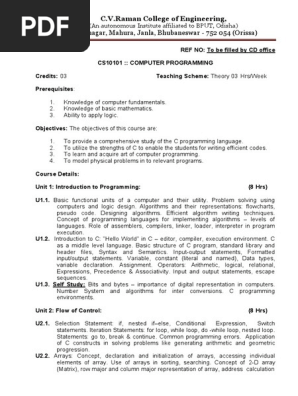0% found this document useful (0 votes)
101 views2 pagesCourse Title: Programming Fundamentals
This document outlines a course on programming fundamentals using the C language. The 4-credit course consists of lectures and labs. It aims to teach students basic programming skills like problem analysis, algorithm design, and program development and testing. The course syllabus covers topics such as computer programming overview, structured programming principles, algorithms, programming constructs, data types, input/output, selection statements, repetition statements, functions, arrays, pointers, characters, strings, structures, file processing and more. The textbook is C How to Program by Paul Deitel and Harvey Deitel.
Uploaded by
Microsoft WelfareCopyright
© © All Rights Reserved
We take content rights seriously. If you suspect this is your content, claim it here.
Available Formats
Download as PDF, TXT or read online on Scribd
0% found this document useful (0 votes)
101 views2 pagesCourse Title: Programming Fundamentals
This document outlines a course on programming fundamentals using the C language. The 4-credit course consists of lectures and labs. It aims to teach students basic programming skills like problem analysis, algorithm design, and program development and testing. The course syllabus covers topics such as computer programming overview, structured programming principles, algorithms, programming constructs, data types, input/output, selection statements, repetition statements, functions, arrays, pointers, characters, strings, structures, file processing and more. The textbook is C How to Program by Paul Deitel and Harvey Deitel.
Uploaded by
Microsoft WelfareCopyright
© © All Rights Reserved
We take content rights seriously. If you suspect this is your content, claim it here.
Available Formats
Download as PDF, TXT or read online on Scribd
/ 2























































































